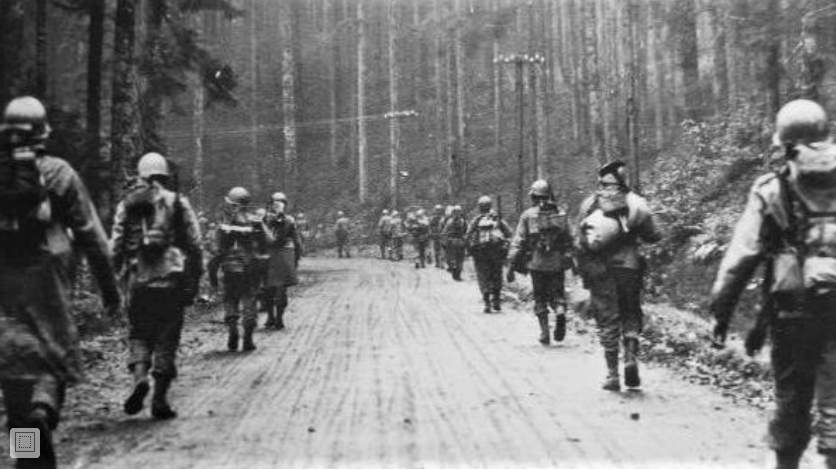More than 16 million Americans served in World War II. My father is one of them. According to the Department of Veterans Affairs, about 234 World War II vets die every day. In failing health, and in honor of his service and Memorial Day, I am re-posting this two-part story.

In chronicling one of the bloodiest battles of World War II, historian Charles Whiting writes, “Thirty thousand American G.I.’s were killed or wounded in the longest battle ever fought by the US Army—a battle that has been ignored for more than fifty years, a battle that should never have been fought.”
My father, Private James Lichtman, was one of the G.I.’s who survived that conflict.
While my brother and I had known of his military service, our dad refused to talk about it for decades. The memories were just too painful. Recently, however, he shared his story, and it began with a copy of Whiting’s book, The Battle of Hürtgen Forest.
At 18-years-old, he was a member of the “Golden Arrow,” the 8th Infantry Division. Arriving in late October 1944, Private Lichtman was part of “a snowy forced march to the Hürtgen Forest,” he writes in his memoir.
“On the first night of the march,” Dad told me, “I slipped and fell to the ground, losing my helmet in the darkness. Lieutenant Moore pushed me forward. ‘Forget it kid. Where we’re going, you’ll have lots to choose from.’”
The Hürtgen was a rugged, fifty-square-mile piece of unforgiving land that lies on the border between Germany and Belgium. While the plateaus were cleared for farming, the valleys were thickly wooded. General James M. Gavin characterized the area as an “ice-coated moloch—Hebrew for costly sacrifice—with an insatiable appetite.”
The Hürtgen more than lived up to its reputation.
“In the six months of the battle,” Whiting writes, “eight infantry and two armored divisions, plus several smaller US outfits, went into the Death Factory. In a matter of only fourteen days most of the rifle companies suffered up to 50 percent casualties. In the case of two unfortunate regiments, the 9th Infantry Division’s 60th Regiment and the 4th Division’s 22nd Regiment, the losses were a staggering 100 percent.”
“Since landing in France,” Dad described, “our battles were not as severe as D-Day. The 8th arrived at the tail end. Nonetheless, my survival was miraculous.
“About 20 miles down the road, we camped close to some hedgerows. The next morning, my head was down as a baby stroller ran over my left foot with a tiny passenger in tow. I looked up and saw a beautiful French girl. In what little French I understood, she asked, “Could I have your chocolate bar for my baby?”
“‘Oui,” I said, as I reached into my top pocket and handed her my bar.
“‘Merci Beaucoup,’ she softly said.
“As she wheeled down the row of soldiers, no one gave anything to this mother and baby. Another face of war.
“The German automatic fire, and the deadly 88mm cannons, accounted for most of the slaughter in the Hürtgen.”
The 88s were anti-aircraft and anti-tank artillery guns widely used by the German army.
“Seven trainloads of 88mm shells shattered trees that killed as many as a direct hit. We replaced the 18th Division after they were slaughtered by the overwhelming German weaponry.
“Close to Thanksgiving,” Dad said, “Our company commander, lieutenant Moore, asked me to check on meals at the mess area. After I returned, I sat down and noticed that my feet were painful and swollen red. I tried to take off my ankle shoes but couldn’t. I struggled through the pain to take them off. I tried to warm my foot. It took me an hour of pushing and pulling to get the ankle boots back on without laces.
“‘For God’s sake,’ Lt. Moore said as he watched, ‘don’t take them off again! Go to Battalion Aid if we’re not under attack.’”
“How do I get there?”
“‘You’ve been there before. It’s near the mess camp.’
“The night was painful as hell, but I was alive and that’s everything in combat.
“As I left the foxhole the next morning, Lt. Moore said, ‘Remember to keep your head about you.’
“Stumbling off, my feet grew more painful with every step. I crossed the fire break from right to left because the fire from Jerry’s burp guns had crisscrossed the area with dirt flying all around me. I was dizzy with pain and exhausted as I lay down. After ten minutes, the gunfire stopped.
“I found another foxhole and hobbled in finding two soldiers huddled together. None of us said a word.
“Suddenly, the Germans spotted our location among the trees. The mortar barrage came quickly to one corner of the foxhole, then the other. Having learned about triangulation, I knew where the next round would hit. As quickly as my frozen feet would take me, I got about 20 feet from the foxhole when an 88 round hit the hole dead center.
“‘Thank you, God,’ I said as I crawled away.
“Working my way to the aid station, I heard some soldiers shouting at me about a minefield in my path. My subconscious said, ‘keep going.’ Somehow, I miraculously survived.
“Battalion Aid was within sight.”
The story concludes on Tuesday.
Comments










